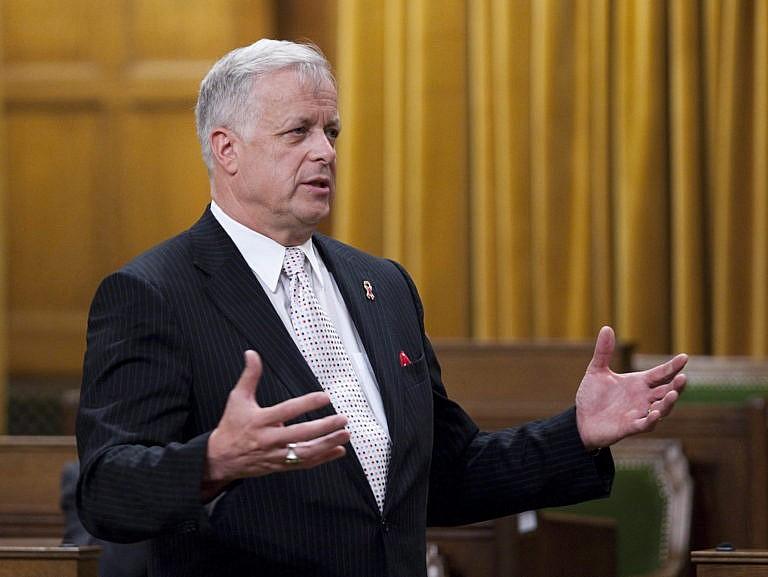The Maverick Party wants in—sort of
Jen Gerson: The new western conservative party’s plan is re-create the Bloc Québécois, and carve out a quasi-independent subnational entity just like Quebec

Then Leader of the Government in the House of Commons Jay Hill speaks on June 15, 2010 (Sean Kilpatrick/CP)
Share
Anyone watching the never-ending soap opera of Alberta politics will no doubt have one pressing question heading into the federal election. And it’s not “by how many votes will the Conservatives win?” no. It’s: “What happened to WEXIT?”
You may recall from the Before Times, when anger at Ottawa and Justin Trudeau was about to boil over into street riots, we covered the rise of WEXIT, a political movement dedicated to western separation of some variety. Back in 2019, the movement even promised to create a federal party, by which to send its agitated members to storm Parliament.
Well, they did. WEXIT actually completed the procedural leg work required to get the party eligible with Elections Canada back in January of 2020.
Then “it basically sat dormant for six months,” said Jay Hill, the interim leader of the Maverick Party. Near the end of June, the leader of WEXIT handed over the reins to Hill, a former long-serving MP for the riding of Prince George—Peace River. Hill took over, and under his stewardship, has since made significant changes to the party’s overall mandate and approach—all of which will presumably make it a much more palatable alternative to the majority of Alberta voters who are not separatists. They also renamed the entity the Maverick Party to differentiate it from the still-active WEXIT movement.
“We restructured the party and we came up with quite a different mission statement for the party from what it was as WEXIT Canada,” Hill said. “WEXIT was singularly focused on independence, on separation…that is not the mandate or the mission statement of Maverick. We’ve change that quite dramatically to come up with a twin-track approach to greater western autonomy, fairness and respect.”
Those perusing Maverick’s website will note some old and familiar hits; the party supports many of the options proposed by Jason Kenney’s Fair Deal Panel, for example.
“Things like pursuing the possibility of the west’s own pension plan, the west’s own provincial police forces, a western chief firearms officer so we can have our own firearms laws—not made in Toronto but made for Western Canada. Greater control of our taxation so we don’t just send our taxes to Ottawa to be frittered away elsewhere,” Hill noted.
In other words, Maverick is following in the path of previous western-centric parties. It’s consciously attempting to re-create the Bloc Québécois, and carve out a quasi-independent subnational entity just as Quebec has done.
The last two points on Hill’s wish list seem fanciful, as even in Quebec criminal legislation around gun control remains a federal purview. Likewise, Quebec collects its own taxes, but Ottawa still redistributes them.
There are also a number of goals around constitutional changes that, again, seem unlikely to be politically feasible any time soon.
Further, there have been attempts at similar parties in the past—notably the Western Canada Concept.
That said, it’s not Hill’s ambition to form government. Maverick will remain a thoroughly regional entity.
“The minute a party goes national …obviously if they want to be government, and all national parties do, they have to appeal to where the most votes are, and the most seats are, and that’s in the corridor between Windsor and Quebec City,” Hill notes.
The Maverick Party is only running 27 candidates—the bulk of them in rural ridings in Alberta. The party selected seats that are already held by overwhelming conservative majorities. This was done purposely; so no one could accuse the party of allowing a Liberal or an NDP candidate to run up the middle of a split vote.
Hill wants to break the assumption that “westerners have to stay with Conservative parties otherwise Trudeau will win. Well, we’re not going to affect the result of whether Trudeau wins or not. That’s going to be decided in ridings other than the ones we run in.”
The Maverick Party doesn’t need an overwhelming bloc of seats—it only needs enough seats to hold a balance of power in a minority government. This is what might give the west leverage in Parliament—similar to how the Green Party was able to force policy concessions from the B.C. NDP government in that province’s last legislative session.
“It’s fully our intention to split the conservative vote,” Hill said.